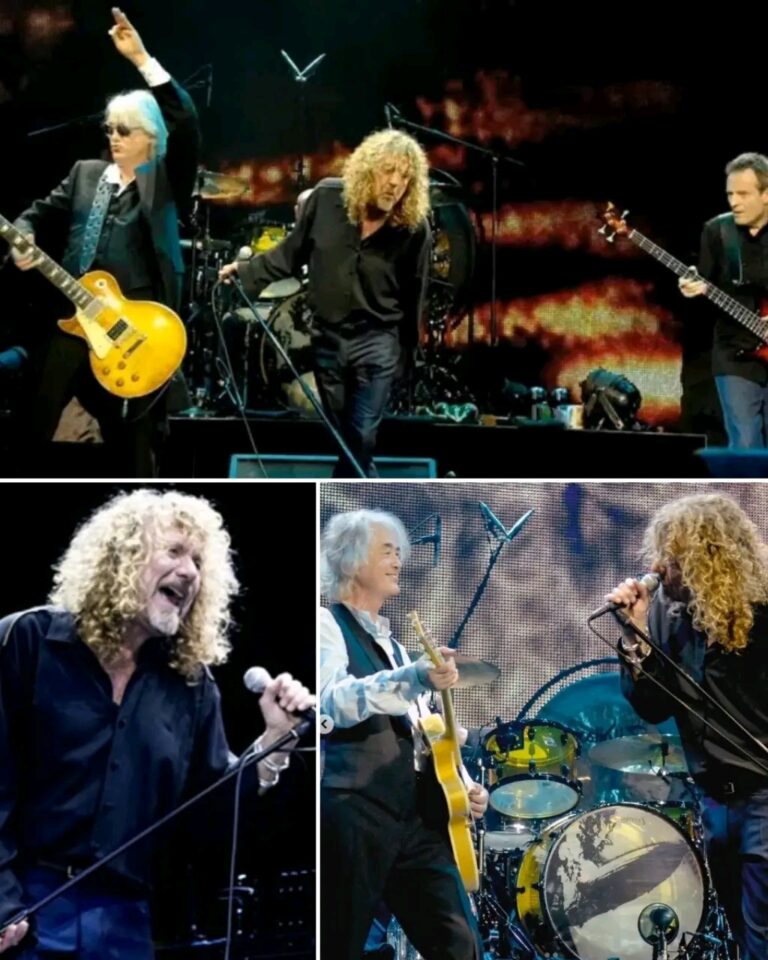Some concerts are loud. Some are historic. And then, there are nights like this—where music feels like prophecy fulfilled. Where legends don’t just return, they rise from the ashes. The reunion of Led Zeppelin at London’s O2 Arena wasn’t a mere performance. It was a resurrection—thunderous, spiritual, and unforgettable.
After nearly three decades of silence, the band that defined hard rock for generations stepped onto the stage not for profit, not for promotion, but for something more powerful: tribute. This once-in-a-lifetime show honored Ahmet Ertegun, the Atlantic Records founder who signed them, believed in them, and stood by them as they changed the face of music.
And what better way to honor a music titan than to awaken the gods?
The Weight of a Moment
Led Zeppelin had not performed a full-length concert since disbanding in 1980 following the death of their drummer, John Bonham. Over the years, rumors of reunions surfaced—and faded. Hope burned, then dimmed. But this night, December 10, 2007, was real. The setlist was real. The roar of 20,000 lucky souls inside the sold-out O2 Arena was deafeningly real.
Jason Bonham, son of the late John Bonham, stepped into his father’s shoes—not to imitate, but to honor. And honor he did. With every cymbal crash, every pulse of the bass drum, Jason brought not just rhythm but bloodline to the reunion. His performance wasn’t a placeholder—it was the heart of the band beating again.
The Gods Return
From the opening riffs of “Good Times Bad Times,” the tone was clear: Led Zeppelin wasn’t here to stroll through nostalgia. They came to play. Jimmy Page’s guitar snarled, sliced, and soared with the precision of a man not re-living his glory days, but expanding them. Robert Plant, silver curls flowing, defied time with a voice that still roared and whispered with mystic power. John Paul Jones, the quiet architect, provided the spine of it all—his keyboards, bass, and presence giving shape to the chaos and power.
They tore through a dream of a setlist—“Black Dog,” “Ramble On,” “Misty Mountain Hop.” But it was the seismic energy of “Kashmir” that brought the crowd to a different plane. That unmistakable, hypnotic riff echoed like the sound of ancient giants stirring. Thousands stood frozen, then moved as one—caught in a moment that was, truly, music made myth.
One Night Only
No one knew what to expect. Reunion concerts often bring mixed results—aging stars, lost chemistry, nostalgia masking the rust. But this was different. There was no rust. This wasn’t just a show. This was thunder answering thunder. A band once shattered by loss returned not with gimmicks, but with purpose and fire.
Robert Plant later said he had resisted reunions for years because he didn’t want to tarnish what they had. That night, he didn’t just protect the legacy—he amplified it.
Page, now in his sixties, played with the fury and elegance of a man half his age. His solo in “Stairway to Heaven” wasn’t just note-perfect—it was soul-perfect. And the look between him and Plant as they finished the song spoke volumes—decades of distance bridged in one sacred moment.
For Those Who Dreamed
For the fans—some of whom traveled across continents, queued for days, or paid thousands—this wasn’t just a concert. It was a pilgrimage. Many had grown up on Led Zeppelin records, feeling both blessed by their music and cursed by the impossibility of seeing them live. This night rewrote that fate.
As the final notes of “Whole Lotta Love” shook the rafters and the band returned for the closing explosion of “Rock and Roll,” the crowd wasn’t watching a reunion. They were part of a resurrection. Strangers hugged. Tears flowed. Cheers turned to primal screams. For those who had always felt born in the wrong era, this was their era—if only for a night.
A Moment That Shook the World
Critics unanimously hailed the show as one of the greatest reunions in rock history. Rolling Stone called it “a moment in rock and roll time that can never be repeated.” The Guardian described it as “earth-shattering.” And among fans, stories of that night are told in hushed, reverent tones—as if recalling a religious experience.
Despite hopes for a full tour, this performance remained singular. One show. One night. No encore tour, no follow-up album. Just one seismic statement: Led Zeppelin was alive—and still unmatched.
Epilogue
Looking back, the night at the O2 Arena wasn’t just about Led Zeppelin. It was about what music can do—resurrect memories, bridge generations, and remind us what greatness looks and sounds like. It was about honoring the past, confronting the present, and gifting the world a glimpse of immortality.
And for those who were there—or even those who watched from afar—it felt like the universe paused for a brief, blistering moment. As if the gods of rock looked down, smiled, and said, “Let there be light.”
And there was.
